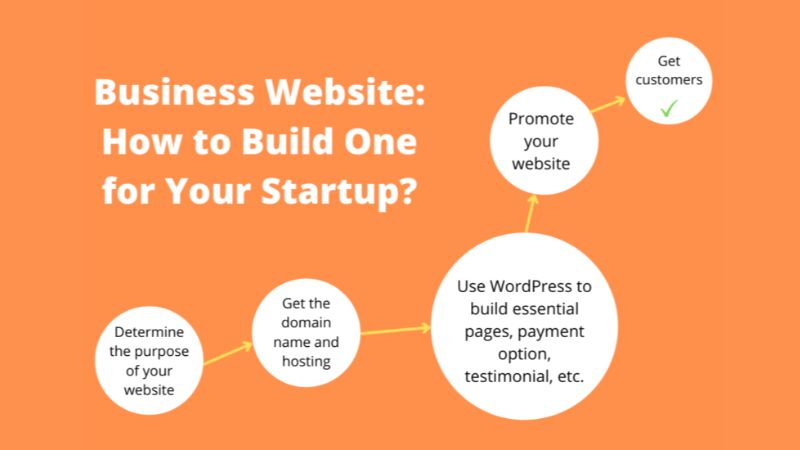“Your online presence is your brand’s first handshake with the world; make it strong, inviting, and memorable.” — Germany Kent
This pace of digital importance upsurges even further after the COVID-19 pandemic.
So, how can you build a great startup online? How can you stay ahead in the online startup race? What is the first step towards a good digital startup?
The answer is; a great business website.
A business website is an interactive platform that informs, engages, and converts customers online. It improves the reach and interactive capability of business in the world with the customers. Build trust, adds professionalism, and centralize the overall business process online

THE 7-STEP STARTUP SUCCESS FORMULA - DR. ANU KHANCHANDANI
Every entrepreneur’s journey is a mix of failures and successes. The probability of failure is higher, however, there is a way to grow and keep growing until you build a successful startup. This book is one such guide to help you with 7 formulas for your success.
Importance of a Business Website
Your business website provides easily accessible information about your startup to everyone on the internet. It’s globally accessible, influences customers even when you are sleeping. When ranking, it generates organic traffic or organic leads for your product or services.
Your website lets you display positive reviews or testimonials of your existing customers. Such word-of-mouth builds trust, confidence, and credibility, and impacts the purchase decision of the customer positively.
Further, a well-built website establishes you as an expert in your industry, helping your startup in marketing and making sales.
Overall, it’s a must from a small-scale business to a large-scale enterprise.
Steps to Build Your Business Website
When starting a startup, founding members often approach web-development companies for outsourcing their website development.
However, often the charges are too high, adding a financial burden to the founders. Therefore, we will be sharing the steps to build your own business website, easily and effectively and boost your startup growth.
Let’s start!
1. Determine the Purpose of Your Website
When building a business website, you should be clear about the purpose of your website. This clarity helps to build a great funnel that not just informs your prospect about your product or services but also helps in conversion. Determine these before starting developing your website:
- Your target audience (so for your website)
- The services or the product you will be mentioned on your business website
- The geo-location you are targeting
- Will it be an eCommerce website or a simple website for informing your startup?
2. Fix Your Domain Name
Your business website will have a domain name; most probably the name of your startup. For example; if your startup is named “The Grey Cells” then the most suitable domain name will be “thegreycells.com”.When choosing a domain name, keep these things in mind:
- It must be related to your startup name (if possible, keep it exactly the same)
- The domain name should be unique
- Keep it short, easy to remember and relatable
|
|
Thank you for Signing Up |


3. Get a Web-Hosting
Every website needs a good hosting server, to store your data and web pages on the internet. Hosting determines the speed, security, the performance of your website, hence it’s important to be clear and confident when purchasing hosting for your website.
Hosting companies like Bluehost, Hostinger, Dreamhost, Hostgator, etc. are some of the popular and affordable in the market.
On successfully purchasing hosting, you will have access to your WordPress dashboard, if hosting has WordPress pre-install. Else you can install WordPress in your cPanel.
4. Build Essential Pages
More than 40% of the websites are built on WordPress, and it is found to be the most efficient way to build a business website, because it provides you the complete environment to build, and market your blog for FREE. Once on WordPress, install all required plugins, like Elementor, WPForms, SEO, JetPack, etc, that provide additional features to your website. Then start creating essential pages using Elementor. The major pages every business website needs are:
- Home page
- About us page
- Service pages
- Testimonial pages
- Product pages
- Contact us page
- Privacy policy page
Elementor provides you with a few good free templates to use and quickly build your website. Also, there are several good template plugins available that you can try for free. Payment system: If your startup involves online transactions, as in the case of eCommerce, then adding a secure electronic payment option to your website using payment plugging could be easily achieved. Install and set up the plugin, and it’s done.
5. Publish & Keep Website Updated
Finally, after completing the web-development part, launch your website, test and confirm the functioning of each page and features on major web-browsers as well as mobile devices.
Create posts for each social platform, and announce the launch of your business website. Welcome your network for their feedback, keep updating and improving your website features and content.
Next is marketing.
6. Blog & Market Your Website
Your business website would be the center of all your digital marketing efforts. Also, it will be the main conversion point of your business. Hence, the more traffic you have, the better it is!
To get traffic, promote your business website on social platforms through consistent posts, use Quora for questions/answers, create images that engage people with your product or services on Instagram and Pinterest. Stay active on LinkedIn, and build quality business connections.
Blog posts are another powerful way to rank for SERPs and gain organic traffic. Implement SEO strategies to your website and posts to improve ranking factors.
Paid Ads; like Facebook Ads, Google Ads, or others are something that can give a kickstart to the growth of your business website.
6. Blog & Market Your Website
Your business website would be the center of all your digital marketing efforts. Also, it will be the main conversion point of your business. Hence, the more traffic you have, the better it is!
To get traffic, promote your business website on social platforms through consistent posts, use Quora for questions/answers, create images that engage people with your product or services on Instagram and Pinterest. Stay active on LinkedIn, and build quality business connections.
Blog posts are another powerful way to rank for SERPs and gain organic traffic. Implement SEO strategies to your website and posts to improve ranking factors.
Paid Ads; like Facebook Ads, Google Ads, or others are something that can give a kickstart to the growth of your business website.

Conclusion
Following these steps, you can build your business website for your startup easily with WordPress. It would take about a week to get the first, presentable version, ready to be launched.
Marketing and upgrading are constant!
A great website or a great online presence will prove to be game-changing for your startup. From conveying information to driving sales; a website is much in the present digital world for every startup.

With over two decades of experience in the software technology arena, having worked in multinational and SME companies in India, USA and Singapore in the capacity of programmer to CTO – I felt now was a good time to give back to the world what I have learnt in this journey. Even if it ends up benefitting a few of my readers by giving them insight or solving a technical issue, I think I will have achieved my mission!


